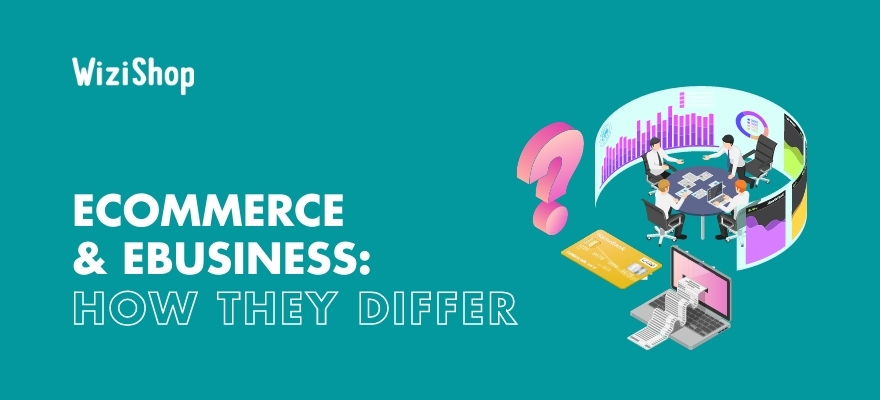If you’ve started thinking about launching your own ecommerce website to sell products, you’ve likely encountered a wide range of terms related to online sales in your research.
Though similar sounding, terms such as digital commerce and ecommerce, along with social commerce and others, have different meanings. Learning the correct terminology early on is advantageous to your success as a new ecommerce entrepreneur!
For instance, while ecommerce and ebusiness are generally viewed as synonymous, they actually stand apart in critical ways. While ecommerce is a part of ebusiness, not all ebusinesses conduct ecommerce activities.
Essentially, ebusiness is a broad concept that involves ecommerce and other endeavors. However, this is only one of the differences that’s important to understand.
Identifying the critical differences between these two terms may initially seem confusing because there is a degree of overlap. However, further review will clear the air and improve your understanding of both categories.
What is ecommerce?
You can think of electronic ecommerce as the online or digital version of a physical store. A seller offers products for sale online, and the entire purchase transaction is completed digitally.
Ecommerce’s importance is growing everyday, as an increasing number of consumers are heading to the internet for their shopping needs. There are a wide range of stores that directly sell their own products to consumers.
You may be familiar with many of the top ecommerce sites operating today, such as Amazon, Walmart, eBay, and others.
Types of ecommerce
There are actually several kinds of business models that fall under the ecommerce umbrella. Each involves a different relationship between the seller and the buyer. Here are six of the most common types of ecommerce today.
1. Business to business (B2B)
The B2B model describes a business that conducts online transactions with another business. A good example is an online office furniture store.
The buyer and seller come together to execute the transaction online, and the products are shipped to the customer. Employees from these two businesses do not need to meet to finalize the transaction.
2. Business to consumer (B2C)
A B2C platform is the type that you may be most familiar with as an online consumer yourself. Under the B2C model, the business sells its products or services over the internet to private or individual customers rather than to a business.
Internet shopping is increasingly popular with consumers because of its convenience, and it’s attractive to businesses because of the relatively low overhead.
3. Business to administration (B2A)
Some businesses cater specifically to government organizations and offices. When these business transactions are completed over the internet and involve the sale of products or services, they qualify as B2A activities.
These actions may include online HR, accounting, and legal documentation services; the sale of office supplies; and more.
4. Consumer to consumer (C2C)
There are instances when an individual wants to sell new or used items or their services over the internet. Often, C2C undertakings are conducted via an online classified ads platform or another type of marketplace that connects the parties involved in the transaction.
5. Consumer to business (C2B)
Consumers may also offer their products or services directly to businesses. These items are intended for business use and are conveyed electronically.
Services like an individual developing a website, a business logo or other similar items digitally may also qualify as C2B. As is the case with other types of electronic commerce activities, the participants don’t need to meet face to face during the transaction.
6. Consumer to administration (C2A)
A C2A business model involves a consumer offering his or her goods or services digitally to a government office or department. This could include tech-related services that are completed remotely, online consulting and many other types of items and services.
In some cases, consumers or businesses may target more than one kind of buyer, and these business models are still classified as ecommerce.
What is ebusiness?
Ebusiness encompasses all types of ecommerce transactions, but it extends farther than that. It also covers online money-making activities where goods and services don’t change hands.
For instance, a blogger running a monetized blog makes money through ads and affiliate marketing on the blog. The blogger doesn’t actually sell products or services directly to a consumer, business, or administration.
This is therefore an example of an ebusiness that isn’t involved in ecommerce. Another example is a website that facilitates electronic payments.
Most businesses today complete various operations and processes online. However, an ebusiness may also conduct business through an intranet or an extranet network.
Types of ebusiness
While there are six classifications of ecommerce transactions, there are only two primary classifications for ebusiness.
1. Pure play
A pure-play ebusiness is one that conducts all of its business activities online. In addition, its transactions are entirely service based. No goods change hands. In a broader sense, a pure-play business only focuses on one line in its business model.
2. Brick and click
The other kind of ebusiness is commonly referred to as brick and click. It describes businesses that conduct their endeavors online and in person. A common example of this type of model is a retailer that sells its products in its own store as well as online.
Key differences between ecommerce and ebusiness
Now that you know what ecommerce and ebusiness are and the kinds of businesses that fall under them, it’s important to understand how they differ.
At the most basic level, ecommerce involves buying and selling services and products through the internet. Ebusiness can include ecommerce undertakings, but it doesn’t have to.
More specifically, an ecommerce company is viewed as being extroverted because its operations often involve distributors, suppliers, and customers. Its transactions revolve around the conveyance of money in exchange for goods or services.
What’s more, an ecommerce business must have a website, and it relies on the internet to conduct its activities and to complete transactions.
In contrast, ebusiness is both introverted and extroverted. It conducts internal and external actions via internet, intranet, and extranet technologies. While its models involve monetary transactions, they also may include allied-related transactions.
Conclusion
Hopefully this article has provided you with a deeper understanding of ecommerce and ebusiness along with their differences, allowing for a more robust comprehension of internet business activities.
Go forth with this knowledge to determine how to best combine the two to make your online business as successful as possible!
Keep in mind that when choosing your ecommerce platform to build your website, you’ll want to be sure that it allows you to have all the important functions needed for electronic commerce. A high-quality online store builder like WiziShop makes all the difference.
The English version of WiziShop’s ecommerce solution will be available in the near future, so be sure to visit our homepage and provide your email address to sign up for early access and email updates!










